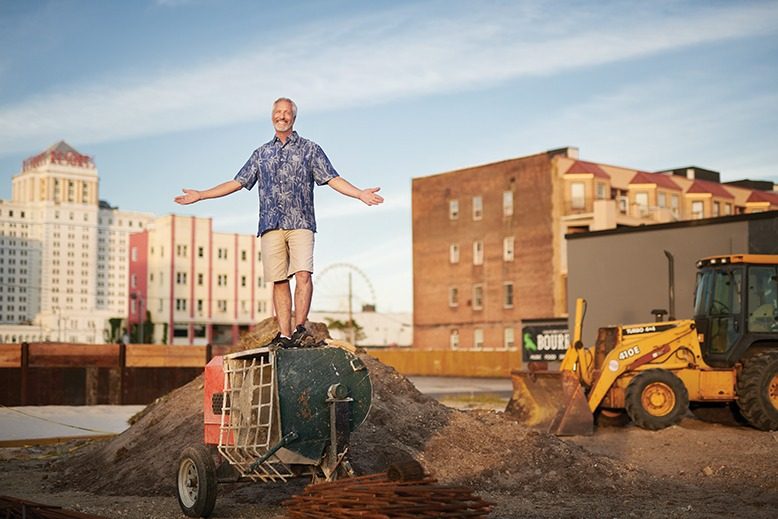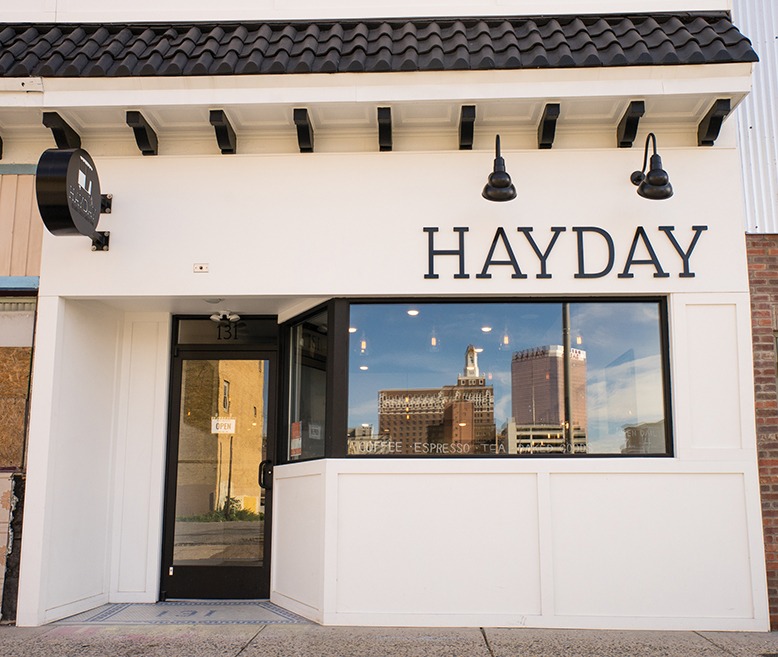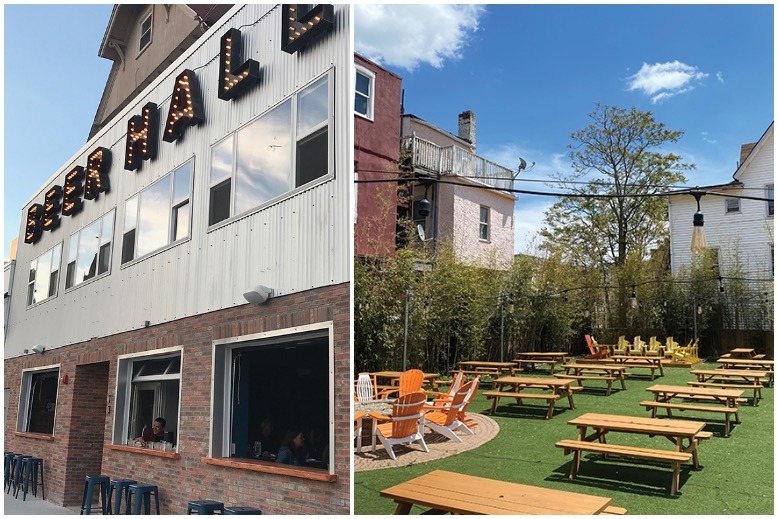
On an unseasonably warm February day, pre-Covid-19, developer Pat Fasano waxed enthusiastic as he stood outside Bourré (boo-ray), a New Orleans–style restaurant and performance venue opened last year on New York Avenue in Atlantic City. The block still looked forlorn—empty lots and dilapidated buildings—but Fasano’s excitement was infectious as he described his ambitions for the 20 contiguous properties he had purchased along what is being called the Orange Loop. The district takes its name from the streets represented in orange on a Monopoly board, the game’s big-money real estate earners: St. James Place and Tennessee and New York avenues.
Fasano’s plans for New York Avenue (via NY Orange Deeds, his development company) include replacing closed strip joints, a crumbling hotel and decrepit apartment buildings with upscale residential units, an artisan coffee shop, restaurants and bars with live music (such as Bourré), commercial office space, a consignment shop and a cannabis dispensary. Two hotels are also planned. One will be a revamp of the defunct Cardinal Hotel, the other an uber-hip, 20-room hotel assembled onsite and constructed by combining two 8′ x 20′ shipping containers. It will be loosely modeled on a property Fasano saw while working on a project in Costa Rica.
“I want to bring fun and excitement back to Atlantic City,” said Fasano. “A shipping-container hotel? That’s interesting. That’s fun.”
Games of chance are what contemporary Atlantic City is known for, and many a developer has arrived hoping for a big payoff in this Shore town, once known as America’s Playground. Since casino gambling came to AC in 1978, most building projects have centered around gaming and the Boardwalk, but revitalizing the city’s family-resort roots is what Fasano and several other Orange Loop developers are banking on.
“In recent years, AC has been all casinos and seedy businesses,” said Fasano. “I want to return it to what is in its DNA: a Shore town with entertainment and restaurants and more to do than gamble.” He noted that in AC’s pre-casino heyday, New York Avenue boasted a robust music scene.
[RELATED: An Alluring Childhood Trip to the Atlantic City Boardwalk]
Fasano opened Bourré last summer. The 6,000-square-foot former gentlemen’s club hosted music most weekends prior to the Covid-19 shutdown. As Covid-19 took hold and the weather warmed, Fasano was quick to shuffle the deck on this summer’s plans. “I’m doubling down and pressing my bets,” he now says.
Bourré, which features Cajun cuisine like alligator sausage and crawfish étouffée–smothered french fries, is optimizing the outdoors. “Having so much outdoor area was a great idea before Covid,” Fasano says. “Now, having it makes us geniuses.”
The restaurant’s garages open to what he calls the container court, where the hotel will be constructed. This summer, instead of the build-out, Fasano is using a shipping container to create a temporary space with a bar and possibly a stage. To further transform New York Avenue, Fasano is creating green space with grassy areas and more than 100 plants and flowers. There will be trees strung with lights, well-spaced picnic tables, fire pits and a plot of sand with beach chairs and a volleyball court. “It will be really festive and comfortable,” he says.

Fasano knows a thing or two about Shore-town comebacks. In 1998, he began rehabbing buildings in Asbury Park. His first was on Bangs Avenue; in time, his holdings there included Asbury Lanes, Wonder Bar, the Bond Street Complex and more than 200 condominiums.
“I’m the guy who started it,” he says. “Then the ripples fanned out.” As Asbury Park regained popularity, other investors flocked to the seaside town and, Fasano says, city regulations began complicating building prospects. “But that’s okay,” Fasano says. “I made my mark. Once you muscle your way through, the big guys come in. I was a pioneer there and got the ball rolling.” Fasano still owns some residential and commercial properties in Asbury Park, but much of his focus has moved to Atlantic City, where he has invested about $4 million in real estate, with another $4 million in improvements planned.
“I’m taking a page out of everything that was right about Asbury Park and applying it here,” he says. Atlantic City, he points out, has some assets not found in Asbury, including a wealth of parking, free beaches and bars with no closing time.
Fasano, 64, started in real estate at 19, while working his first restaurant job in New Brunswick. “My friends were going to Rutgers, and I was rehabbing buildings there,” he says. Eventually, he was renting apartments to Rutgers students.
After Stockton University opened a satellite campus in AC in 2018, Fasano looked into buying a building in the city’s Gateway section. Around the same time, he bought a home in lower Chelsea. When a Rutgers University study identified what’s now the Orange Loop as the best place to buy real estate in AC, he refocused his investments.
A small wave of optimism about inland AC had already begun. In 2013, developer Mark Callazzo, managing partner of Lucern Capital Partners in Shrewsbury, opened the Iron Room—a pocket-sized, off-the-beaten-path restaurant on Albany Avenue—with a menu of inventive small plates and a wide selection of beer and whiskey that earned widespread praise.
One night, during a chat with the restaurant’s staff, Callazzo learned that none of them lived in Atlantic City. “There’s nothing to do here,” they told him. “I felt like there was an opportunity to change that,” he says.
“I thought, If I can get some other developers interested, we could create a kind of main street. I pictured South Street Seaport [in Manhattan] or even Bourbon Street, with open containers, where people can walk with drinks from one spot to the next,” Callazzo says.
“Separate, but together” is how Fasano describes the synergy of the Orange Loop developers. “We’re not partners, but in essence, there are partnerships,” he says of the matrix of collaborations and interconnected projects of the Orange Loop rebirth.

The Tennessee Avenue exterior of Hayday, which will move to New York Avenue in late summer/early fall. Courtesy of Matt Crowne Productions
The area’s renaissance began in 2018 on Tennessee Avenue with the Leadership Studio, a nonprofit, community yoga space. Hayday, a coffee shop, was another early comer to Tennessee Avenue. Opened in 2018 by longtime friends Evan Sanchez and Zenith Shah of Authentic City Partners (ACP) with Hayday cofounder Loryn Simonsen, it is AC’s only independent coffee shop. The trio grew up in and around Atlantic City and worked on the Boardwalk and in casinos. Their commitment to the area brought them back and led to the launch of Hayday, a place for locals to gather.
“Zenith and I met [Callazzo] shortly after moving back to the area,” says Sanchez. “We had a similar idea to build small businesses in one area—initially one street—to create a center of gravity and focus point for the future of Atlantic City. Our mantra was, “‘A better block for a better city.’”
Hayday started as a tenant in one of Callazzo’s buildings on Tennessee Avenue. After a brief close, the coffee shop will reopen in late summer or early fall on New York Avenue in the multiuse Bywater Building, jointly owned by ACP and Fasano.
“The success of each business builds off the others,” says Fasano, who is collaborating with ACP on the Cardinal Hotel revamp. “We’ll keep layering and layering until we build a critical mass.”
Tennessee Avenue is off to a strong start with Callazzo’s burgeoning businesses such as MADE, a bean-to-bar chocolate shop featuring handmade chocolates, desserts and chocolate-infused cocktails; the Tennessee Avenue Beer Hall, a brewpub that displays local art and offers more than 100 beer choices; and Rhythm & Spirits, a restaurant with craft cocktails and late-night live music. The Iron Room reopened on Tennessee Avenue this summer.

Amid this summer’s Covid-19 restrictions, the Tennessee Avenue Beer Hall is offering outdoor dining and live music. Courtesy of Tennessee Avenue Beer Hall
Urban renewal projects often walk a thin line between revitalization and gentrification. The Orange Loop is no different, but Paige Vaccaro of Linwood, who runs the nonprofit Communities Revolutionizing Open Public Spaces (C.R.O.P.S.), maintains a cautious glimmer of optimism that developers will make more than cursory efforts to be inclusive of Atlantic City’s current residents.
C.R.O.P.S. operates four community gardens in AC, and runs several farmers’ markets. “It is extremely important for [the developers] to work with organizations like mine,” she says. “I want to see AC people behind the bar, waitressing—not just working in the parking lot. Paid work that can sustain a household and affordable housing should be part of their plan.”
So far, Vaccaro has hosted two joint events with the Tennessee Beer Hall and last summer participated in a recurring Sunday community market held at Bourré. The markets, says Vaccaro, are a starting point toward inclusivity.
While Covid-19 restrictions put a bump in the road, the delay of some of the proposed construction has led to creative workarounds. “We had an outdoor comedy show,” says Callazzo, referring to a late-spring event. “The comedians were on a makeshift stage while folks stayed in their cars and listened through an AM radio station. They beeped their horns as applause. It was great.” At the Tennessee Avenue Beer Hall, he says, there’s room for 200 people, with space for six feet of social separation. The Beer Hall is repeating the outdoor movie nights offered last year. A recent collaborative bar crawl looped in restaurant neighbors, and, new this summer, a drive-in concert is planned on an undeveloped Tennessee Avenue lot.
Libations always flowed readily in AC casinos and restaurants, but this summer, for the first time, revelers are allowed to drink openly on the Boardwalk, at Gardner’s Basin and along the Orange Loop. Mayor Marty Small Sr. issued the open-container order in large part because of the need for social distancing. Casinos reopened in July, but as of early August, indoor dining has yet to return, and indoor capacity for gaming venues remains greatly limited. Propelled by a less-than-ideal situation, the open-container zones are a step in the direction of creating that South Street atmosphere in Atlantic City.
While Orange Loop development promises a host of eateries and activities, the new residences with upscale amenities may be the most impactful improvement. Such housing may cause some of the city’s 30,000 or so casino workers to rethink their commutes. Fasano and ACP have already rehabbed the Bywater Building residences on New York Avenue; five of the eight are already leased. The one-bedroom apartments rent for $1,200 and include amenities like stainless steel appliances, granite countertops, in-unit washers and dryers, and front and back decks.
“The only negative in Atlantic City is the perception of it,” Fasano says. “We can’t change the location—and we don’t need to. The perception, we can change.”



